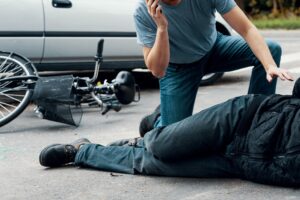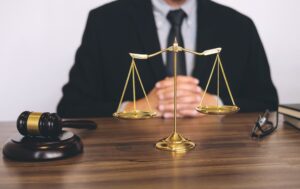Welcome to our guide on what to do after a cycling accident. If you are hit and injured by a vehicle while trying to ride your bike, you may be unsure what to do next. We discuss steps you can take both for the sake of your wellbeing and a potential personal injury claim if another road user was partly or wholly responsible for the collision.
As you go through the guide, you can get information on how to stay safe in the immediate aftermath of an accident and why medical attention is important for multiple reasons.
We also cover useful steps for gathering evidence in case you can pursue a road traffic accident compensation claim.
Seeking compensation for a cycling incident may be helped by the presence of an expert solicitor. We conclude the guide by highlighting the benefits of making a No Win No Fee claim with an expert road traffic accident solicitor from our panel.
You can get even more free advice by calling our dedicated helpline or asking for guidance online. Our 24/7 support service is available through any of these routes:
- Over the phone on 0161 696 9685.
- Through our ‘Contact Us’ query page.
- Using the live chat tab at the bottom of your screen.
Select A Section
- What To Do After A Cycling Accident – Staying Safe
- Get Medical Attention For Your Injuries
- Exchange Details With The Other Party
- Record Any Witness Details
- Take Photos And Gather Other Evidence
- Do I Need To Report My Road Cycling Accident To The Police?
- Keep Any Damaged Possessions
- Contact A Solicitor Specialising In Cycling Accident And Injury Claims
What To Do After A Cycling Accident – Staying Safe
It is important to consider your own safety immediately after an accident, especially if it happens on a busy road. Stay calm, remove yourself from any immediate danger and try to assess your injuries if it is safe to do so. Call 999 if you are seriously injured and need immediate medical attention
The post-crash adrenaline rush can make it hard to judge how much pain you are in, so take a moment to breathe and look at any affected areas. Check your bike helmet for damage as it may reveal whether you hit your head – this is a useful step because a head injury doesn’t always make itself known right away.
Keeping Other People Safe
If you have been involved in a road traffic accident, after checking that you are safe and uninjured first, if it is safe, you could also check to see if others have been injured. If so, it might be advisable to call the emergency services for anyone suffering a serious injury or the police if the incident is blocking the road.
You can also keep the road safe by removing your bike and putting it somewhere out of the way only if you are physically able to do so and it is safe.
Get Medical Attention For Your Injuries
If you are hurt, the best thing to do is call an ambulance or ask someone to do it for you. In the event of an emergency, call 999, or phone the non-emergency number, 111, if you need guidance.
If you think the injuries are not serious enough to call an ambulance, it may still be worth taking yourself to your nearest accident and emergency service (A&E) as soon as possible, especially in the case of a head injury or internal pain. Sometimes the extent of a problem doesn’t become clear until hours or even days later. Even a visit to your GP or a walk-in centre is advisable just to be checked over.
Cycling accidents can lead to the likes of:
- Head injuries.
- A broken pelvis or hip.
- Road rash or lacerations.
- Broken arms or legs.
Apart from getting the expert treatment you need to make a recovery, seeking medical attention is also useful if you intend to make a personal injury claim after the road traffic accident. Medical evidence is one of the potential sources that could be referred to when making a compensation claim.
Exchange Details With The Other Party
If you are involved in a road traffic accident, if it is safe to do so, you should try to exchange details with the other party or parties involved in your cycling accident. If you are injured, then another person could help you do this.
If you have been involved in a road traffic accident with a vehicle driver and injury or damage has been caused, then under Section 170 of the Road Traffic Act 1988 (RTA), a driver must stop and share details with anyone who has a reasonable right to ask.
You can ask for their:
- Name.
- Address.
- Insurance details.
- Vehicle’s make, model and vehicle registration number.
- Confirmation that they are the registered owner.
If they refuse to share details or leave the scene, you could note down the licence plate number and report the incident to the police.
When talking to another affected party, it isn’t advisable to discuss responsibility, as admission could be used as evidence in a claim.
We offer detailed guidance on how to support a cycle accident claim, so please do not hesitate to call if you want to know more.
Record Any Witness Details
Another thing to do after a cycling accident, but only if safe to do so, is to ask potential witnesses at the scene for their contact details. Their input on what happened could be useful both to a police investigation and to a compensation claim. For example, if you are a cyclist hit by a car, then the witness might be able to confirm exactly what happened and show who is liable.
You do not need to get a formal statement from witnesses. Instead, ask them if they are happy to share phone numbers or other contact details so they can be reached later.
Take Photos And Gather Other Evidence
When considering what to do after a cycling accident, it may not necessarily occur to you to take photos. However, they could act as useful evidence, but this should only be done when safe to do so. You could capture images of:
- The vehicles that were directly involved.
- Any skid marks or other signs of how the incident occurred.
- The road and any visible road markings.
- Road signs, traffic lights or other warning signals placed by the roadside.
You could alternatively take photos of a road defect if it caused the accident. In some cases, a crash may not be down to a cyclist or driver’s conduct. For example, if you were injured because your bike fell into a large pothole, you may have a case against the local council.
Do I Need To Report My Road Cycling Accident To The Police?
You are not generally obliged to report a cycling accident. There is also no requirement to make the police aware of a collision if both parties share information and are able to leave the scene.
As we mentioned previously, drivers are required by law to stop and share information in the event of a collision.
If you are injured in a hit and run or by an uninsured driver, you can report this to the police. Cyclists injured by fault uninsured or unidentified drivers can claim through the Motor Insurers’ Bureau (MIB) but will need to have reported the incident to the police first.
If you want to make a claim through the MIB, call our advisors today for a free case assessment. They can tell you if you could be eligible to claim personal injury compensation after being injured by an uninsured or hit-and-run driver.
You can learn more about the different types of claims against motorists and how our panel’s solicitors can help in any case by calling us today.
Keep Any Damaged Possessions
After being knocked over or thrown from your bike, it is entirely possible that your property was damaged in the cycling crash.
Keep hold of any damaged items, as they may be useful forms of evidence. If you make a successful cycling accident claim, your payout can include compensation for general damages for the harm caused and compensation for special damages, which refers to financial losses and out of pocket expenses. These can range from the cost of repairing your bike to losing out on earnings because you were seriously injured and could not return to work.
Retain any receipts, bank statements, payslips or other useful documents after the cycling accident in case you can seek compensation for these losses.
Contact A Solicitor Specialising In Cycling Accident And Injury Claims
Looking for support with a personal injury claim is another important thing you could do after a cycling accident.
A solicitor from our panel could help your case in many ways. They can negotiate with the driver’s insurance provider, offer expert advice and help make claiming as stress-free as possible while you focus on the healing process.
Our panel’s solicitors provide their services under No Win No Fee terms. The Conditional Fee Agreement you could sign with them if you have a valid bicycle injury claim means you don’t pay a solicitor fee upfront or during the case. They would not charge anything for their work if they do not help you secure a successful claim.
Should the case win, the solicitor would be entitled to a success fee. Because of The Conditional Fee Agreements Order 2013 and the payment ceiling it established, the success fee can only ever be a small percentage of the compensation you receive.
Whether you want to discuss a compensation claim after your cycle accident, are unsure what your legal options are or just want to ask about the actions you can take, just call today. Our advisors offer free and effective guidance in a consultation you can have at a time that suits you. Furthermore, your case can be forwarded to a specialist solicitor if you have grounds to claim.
Simply follow any of these options to get in touch today:
- Call 0161 696 9685.
- Go online to contact us and share details.
- Send a message through the live support function below.
Learn More About What To Do After A Cycling Accident If You Want To Claim Compensation
Here are some more of our informative guides:
- Our road traffic accident claims calculator guide discusses compensation you could receive for a successful claim.
- An explanation of how a split liability claim allows you to seek compensation even if you’re partially at fault.
- We provide background into how the personal injury claim process works.
Also, take a look at these useful sources:
- Police guidance on collisions and incidents, including their advice on what to do after an accident.
- How to request traffic camera footage, from the National Highways website.
- Advice on when you can claim Statutory Sick Pay is provided through the government website.
We hope this guide has helped you better understand what to do after a cycling accident. For advice on compensation claims and more besides, please call at any time.





